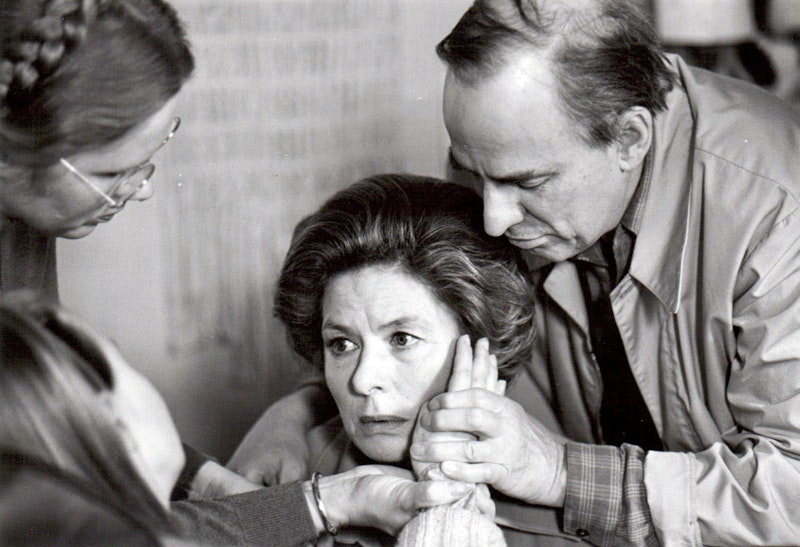Ingmar Bergman was a magician who looked through the lantern and created reality. Common Hollywood statement is that movies are magic. It sounds treacly but its sentimentality is harmless. Bergman, a European director wholly separated from the American tradition, was rarely interested in “movie magic” but in pure confrontation, whether between human beings or God. In all of his films, it’s the encounter (sometimes aggressive and mad, sometimes gentle and loving) that matters most. Bergman’s idea of cinematic climax isn’t that a moment composed of one singular event but of small, seemingly quotidian acts that reveal the inner worlds of humans.
Bergman’s 1978 film, Autumn Sonata, is one long, extended existential confrontation between a mother and a daughter. Liv Ullman plays Eva, a 40-year-old married woman, who hasn’t seen her mother, Charlotte (Ingrid Bergman) in seven years. Their relationship is strained: even before Charlotte arrives at Eva’s home, we learn that Eva resents her yet tries to hide it with simplistic love.
Eva looks more like a little girl with pigtails and round glasses. She’s not sure of herself, and one gets the idea that all of this is entwined in the uneasy relationship with her mother. Charlotte’s the opposite of Eva. She’s strong, self-assured, and vocal about her demands. She appears to be caring and loving toward Eva but it’s clear that everything surrounding this familial connection is wrapped in numerous complications.
Charlotte’s first weakness is revealed when Eva informs her that Lena (Eva’s sister and Charlotte’s daughter) is living in the same house as Eva and her husband. Lena’s sick and has been since she was a little girl with what appears to be some type of neurological disease. Charlotte’s neglected her, and for most of her life, Lena’s lived in an assisted living facility. Charlotte can’t fathom the encounter that’s about to ensue. Despite her cool composure, she’s incapable of pure vulnerability.
The entire visit takes the place of one day and one night but it’s enough to break the emotional walls of pure bitterness. The tension between Charlotte and Eva is visible from the simplest intentions but especially when Eva attempts to give her own interpretation of Chopin. In Charlotte’s eyes, she has failed, once again.
Despite trying to be good and giving daughter seeking reconciliation, Eva unleashes all of the bottled-up hatred and resentment toward her mother during the course of one night. As Eva lists one grievance after another, much of it’s justified: Charlotte chose her career over her daughters and husband. It’s something that Eva got used to because she had no other choice. Her life’s been filled with perpetual sadness and grief that were a reminder of a loveless mother.
Eva destroys every shred of Charlotte’s being with words and screams. Charlotte’s stunned and tries to defend her actions. As they fight, Lena, crawling on the floor is screaming for “mama,” yet once again, Charlotte doesn’t respond. However, neither does Eva. Both women are embroiled in their own selfishness. Charlotte maintains her inability to be vulnerable, and Eva becomes an impish child, claiming that her life has turned out badly because of Charlotte. Ingrid Bergman’s face, at once beautiful and cold, betrays the fact that Charlotte will never reveal anything about herself, and that she’ll continue to hide behind Chopin and Beethoven. She maintains her existence by “intellectual emotionalism” that feeds on a constant exit. In Eva’s words, she’s “an escape artist.”
In a later interview, Liv Ullman has stated how much she disliked Eva, especially her claim that Charlotte is responsible for her life. Ullman also revealed that the tension between Ingrid Bergman and Ingmar Bergman was so palpable that there was always an uncertainty how the film would get finished. According to Ullman, no one dared to question “the genius” Ingmar Bergman. Actors simply followed his direction in every way. But Ingrid questioned everything, especially the script.
Unsurprisingly, Ingmar didn’t like this at all. Judging from the documentary on the making of Autumn Sonata, the two great Bergmans were always (somewhat politely) arguing about the authenticity of Charlotte’s character. “How can someone not remember anything about one’s childhood?” asks Ingrid. Ingmar bristles at her, unwilling to even explain his reasoning.
It’s no secret that Ingmar Bergman has always attempted to work out the issues he had with his own parents through the films he made. Here, especially, we see some aspects of that. In addition, Ingrid Bergman was battling cancer at the time (a disease that would take her life a few years later after the release of Autumn Sonata), and Ingmar appeared to be almost ignorant of that fact. He was so involved in his creation that he failed to see the humanity in his actors.
Just like in many of Ingmar Bergman’s films, we find that the central “character” is existential anxiety. Charlotte wears the mask of music. With every touch of the piano keys, she pushes the truth of existence down. Eva oscillates between child-like wonder and a woman always on the verge of suicide. She has wonderment about God’s creations, yet anxiety presses on the chest and she’s unable to breathe. Charlotte refuses to see the depth of Eva’s perception and pain. Are such confrontations possible or even necessary? Ingmar Bergman delivers the confrontational climax only to be replaced with stasis and the persistence of anxiety. For Ingmar Bergman, the work of being human is never really finished.

